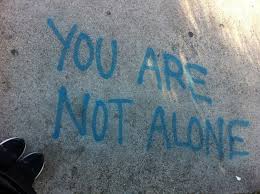A little while back I published some notes on one of Brene Brown’s lectures on vulnerability, and wanted to share some more thoughts with you about another of her lectures that has helped me enormously with my own recent struggles.
Brene Brown describes herself as a “Shame Researcher” and has spent many years exploring the damaging impact of shame on the human psyche and spirit, and how we can prevent our shame from suffocating us, or paralysing us, so that we can still grow and learn, and live courageously.
You can watch this lecture at http://www.ted.com/talks/brene_brown_listening_to_shame…..
…here are my notes on the talk, it resonated with me on so many levels, hope it casts some light for you too…….
Brene Brown
From her TED talk “Listening to shame”
Brene told her TED audience about her research into shame, how it made her look at herself and her own issues, and how she chose to be very honest about her subsequent breakdown. She then said that she suffered the worst “vulnerability hangover” of her life (she describes this as how we feel when we have exposed ourselves as vulnerable to other people and then worry about the potential backlash).
She panicked, because having ‘outed’ herself as having had a nervous breakdown, in a public forum, she could not take it back! A close friend of hers remarked that she was “the worst vulnerability role model ever!”
Brene realised that she was still working hard to engineer staying small and under the radar.
These were some of the main points of her talk….
Vulnerability is not weakness: this myth is profoundly dangerous. And the majority of people believe this on some level. And yet when we witness vulnerability we experience it as profoundly brave.
Vulnerability is emotional risk, exposure, uncertainty, and is our most accurate measurement of courage: to be seen to be honest, to allow ourselves to be vulnerable.
Vulnerability is the birthplace of innovation, creativity and change
We have to talk about shame. No-one wants to talk about it. Shame has been described as “the swamp land of the soul”, we have to walk through it and find our way around. But we don’t have to stay there, we don’t have to wallow.
Theodore Roosevelt said “ …It is not the critic who counts, it is not the man who sits and points out how the doer of deeds could have done things better and how he falls and stumbles, the credit goes to the man in the arena, whose face is marred with dust and blood and sweat, but when he is in the arena at best he wins and at worst he loses but when he fails he does so daring greatly”
So, do we enter the arena? Because when you are considering making yourself vulnerable and being honest and courageous, shame is the gremlin that will tell you that you are not good enough. And when we look up at the critic who is pointing and laughing, guess who it? Ourself.
Shame has too big straplines
“You will never be good enough” and “Who do you think you are?”
And shame is very different from guilt.
Shame is a focus on the self “I am bad.”
Guilt is a focus on behaviour “I did something bad”.
“I’m sorry I made a mistake” is the voice of guilt.
“I’m sorry I am a mistake” is the voice of shame.
And shame is highly correlated with depression, addiction, violence, aggression, bullying, suicide, and eating disorders. So we need to take it seriously, to bring it out into the light and take its power away.
Guilt on the other hand is inversely correlated with those same things, as guilt is our acknowledgment that we have done something that we feel we should not have done, and by acknowledging this, we can take steps to prevent the same thing happening again.
Shame is organised by gender. It feels the same for men and women but is organised by gender.
For women shame is “do it all, do it perfectly and never let them see you sweat” in other words, unattainable conflicting expectations of who we should be.
For men shame is “do not be perceived as weak”. One man that Brene interviewed said he truly believed that his family would rather he died on top of his white horse than see him fall down. I think this is one of the saddest things I have ever heard, I really do.
The guy went on to say “When we reach out and are vulnerable, we get the shit beat out of us and the women in my life are harder on me than the men.” ……. for me it was very sobering to get the male perspective on vulnerability and shame.
Shame is an epidemic in our culture. To get out from underneath it, to find our way back to each other we have to understand the way it affects how we parent, how we work, how we make relationships, and the way we are looking at each other.
Secrecy, silence and judgement are required for shame to grow.
And the antidote to shame? Empathy.
If we are going to find our way back to each other, vulnerability is going to be that path.
The two most powerful words we can say are
“Me too”
……. reveal your vulnerability…..


What a good explanation of shame and very astute. Thanks for posting…it really struck a cord.